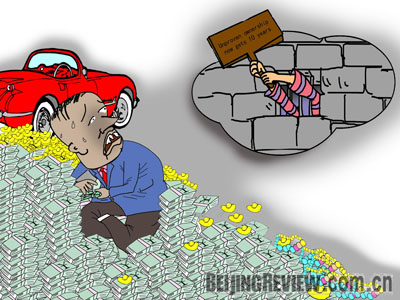|

The maximum punishment for holding large amounts of property with unidentified sources, currently five years' imprisonment, is set to double if a draft amendment to the Criminal Law is adopted.
The Standing Committee of the National People's Congress (NPC), China's top legislature, has been deliberating the amendment since August 25, an indication that China is serious about enhancing its anti-corruption efforts.
It has been a crime for 20 years in China to have large amounts of money and possessions that cannot be accounted for. The Supreme People's Court and Supreme People's Procuratorate along with lawmakers at the NPC now say the current punishment for the crime is too lenient and are advocating a 10-year sentence.
It is common for corrupt officials to refuse to divulge the sources of their wealth when they are caught. This is because the more unidentified wealth they have, the fewer bribes they are deemed to have taken. According to China's Criminal Law, officials will receive severe punishment for taking big bribes, yet much lighter penalties for holding unidentified property.
The debate over whether to raise the imprisonment term has been ongoing. Proponents say that a 10-year sentence is already a severe punishment. In the United States, officials accused of holding large amounts of property with unidentified sources face a five-year jail sentence, plus a fine, while in Singapore a similar offence earns no more than 10 years' imprisonment.
Some legal professionals and scholars, however, downplay the role of the unidentified property crime in preventing corruption, saying that most of the unidentified property is incidentally found in the process of investigation into bribery and/or other allegations. They insist that the key does not lie in the severity of punishment for unidentified property, but in the establishment of a property declaration system. If declaring family property becomes an obligation for officials, then they can be punished by law for violation. This is a tight legal network that may effectively prevent corruption, they say.
Big loophole
Li Kejie (Xi'an Evening News): According to the current Criminal Law, the maximum prison term for officials possessing unidentified property worth more than 10 million yuan ($1.5 million) is five years, while the minimum imprisonment for officials involved in bribery is 10 years, even if the bribe is 100,000 yuan ($15,000). Corrupt officials even face the death penalty for bribery. As a result, many "clever officials" deliberately pretend that they do not know where all their wealth came from, as it is quite probably a bribe. As long as the judiciary can't find enough evidence to prove bribery, it can remain unidentified property. The accusation of holding unidentified property therefore serves as an escape route for apprehended corrupt officials, who use this loophole with increasing regularity.
|
